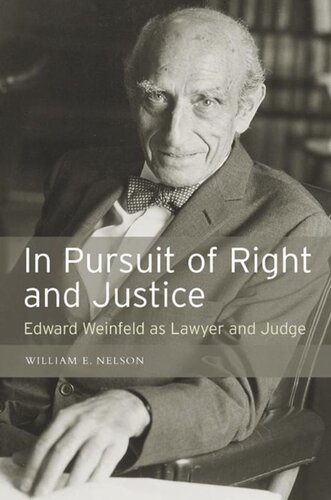

Most ebook files are in PDF format, so you can easily read them using various software such as Foxit Reader or directly on the Google Chrome browser.
Some ebook files are released by publishers in other formats such as .awz, .mobi, .epub, .fb2, etc. You may need to install specific software to read these formats on mobile/PC, such as Calibre.
Please read the tutorial at this link: https://ebookbell.com/faq
We offer FREE conversion to the popular formats you request; however, this may take some time. Therefore, right after payment, please email us, and we will try to provide the service as quickly as possible.
For some exceptional file formats or broken links (if any), please refrain from opening any disputes. Instead, email us first, and we will try to assist within a maximum of 6 hours.
EbookBell Team

4.4
32 reviewsWeinfeld was influential as a judge and community member - representing immigrants and their legal rights.
In Pursuit of Right and Justice chronicles the life of the United States District Court's Judge Edward Weinfeld, from his humble Lower East Side origins to his distinction as one of the nation's most respected federal judges. Judge Edward Weinfeld's personal growth and socio-economic mobility provides an excellent illustration of how Catholics and Jews descended from turn-of-the-century immigrants were assimilated into the mainstream of New York and American life during the course of the twentieth century. Weinfeld left a rich collection of personal papers that William E. Nelson examines, which depict the compromises and sacrifices Weinfeld had to make to attain professional advancement. Weinfeld's jurisprudence remained closely tied to his own personal values and to the historical contexts in which cases came to his court.
Nelson aptly describes how Weinfeld strove to avoid making new law. He tried to make decisions on preexisting rules or bedrock legal principles; he achieved just results by searching for and finding facts that called those rules into play. Weinfeld's vision of justice was simultaneously a liberal one that enabled him to develop law that reflected societal change, and an apolitical one that did not rest on contested policy judgments.